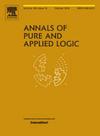Classifying different criteria for learning algebraic structures
IF 0.6
2区 数学
Q2 LOGIC
引用次数: 0
Abstract
In the last years there has been a growing interest in the study of learning problems associated with algebraic structures. The framework we use models the scenario in which a learner is given larger and larger fragments of a structure from a given target family and is required to output an hypothesis about the structure's isomorphism type. So far researchers focused on Ex-learning, in which the learner is asked to eventually stabilize to the correct hypothesis, and on restrictions where the learner is allowed to change the hypothesis a fixed number of times. Yet, other learning paradigms coming from classical algorithmic learning theory remained unexplored. We study the ‘‘learning power’’ of such criteria, comparing them via descriptive-set-theoretic tools thanks to the novel notion of E-learnability. The main outcome of this paper is that such criteria admit natural syntactic characterizations in terms of infinitary formulas analogous to the one given for Ex-learning in [8]. Such characterizations give a powerful method to understand whether a family of structures is learnable with respect to the desired criterion.
分类学习代数结构的不同标准
在过去的几年里,人们对与代数结构相关的学习问题的研究越来越感兴趣。我们使用的框架模拟了这样的场景:学习者从给定的目标族中获得越来越大的结构片段,并被要求输出关于结构同构类型的假设。到目前为止,研究人员主要集中在前学习(Ex-learning)和限制上,前者要求学习者最终稳定在正确的假设上,后者允许学习者在固定的次数内改变假设。然而,来自经典算法学习理论的其他学习范式仍未被探索。我们研究了这些标准的“学习能力”,通过描述集理论工具对它们进行比较,这要归功于e-可学习性的新概念。本文的主要结果是,这些准则可以用类似于[8]中给出的前学习的无穷公式来自然地描述句法特征。这样的描述提供了一种强大的方法来理解一组结构是否可以根据期望的标准学习。
本文章由计算机程序翻译,如有差异,请以英文原文为准。
求助全文
约1分钟内获得全文
求助全文
来源期刊
CiteScore
1.40
自引率
12.50%
发文量
78
审稿时长
200 days
期刊介绍:
The journal Annals of Pure and Applied Logic publishes high quality papers in all areas of mathematical logic as well as applications of logic in mathematics, in theoretical computer science and in other related disciplines. All submissions to the journal should be mathematically correct, well written (preferably in English)and contain relevant new results that are of significant interest to a substantial number of logicians. The journal also considers submissions that are somewhat too long to be published by other journals while being too short to form a separate memoir provided that they are of particular outstanding quality and broad interest. In addition, Annals of Pure and Applied Logic occasionally publishes special issues of selected papers from well-chosen conferences in pure and applied logic.

 求助内容:
求助内容: 应助结果提醒方式:
应助结果提醒方式:


